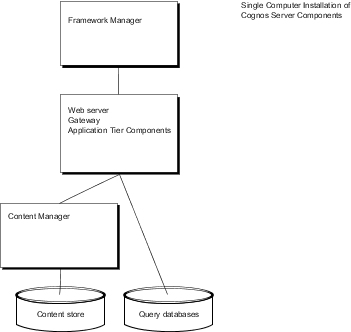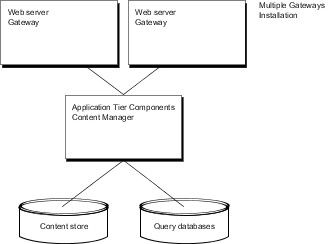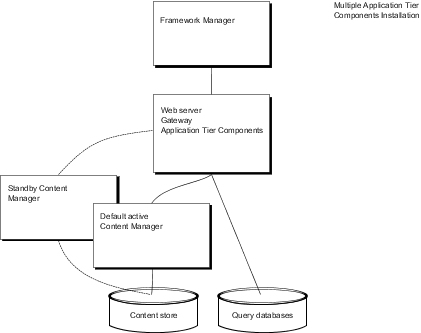
When you install Cognos 8 reporting components, you specify where to place the gateways, Application Tier Components, and Content Manager. You can install these components using any of these options:
Install all components on one computer.
This option is typically used for a demonstration or in a proof of concept environment.
Install the gateway on a separate computer.
In this option, the gateway and Web server are on one computer, and the remaining Cognos components are on other computers. You may choose this option if you have existing Web servers available to handle Cognos component requests.
Install Application Tier Components and Content Manager on separate computers.
Choose this option to maximize performance, availability, capacity, or security based on the processing characteristics of your organization.
If you plan to install Cognos Content Database, you can install it on the same computer as Content Manager or on another computer. If you install it on the same computer, Cognos Content Database is automatically configured for use as your content store. If you install it on another computer, ensure that you set the connection properties for Cognos Content Database on your Content Manager computer.
Install Cognos 8 reporting components on the same computer as other Cognos 8 products.
Cognos 8 shares components for reporting and for scorecarding, such as the Content Manager. If you plan to install both Cognos 8 reporting and scorecarding components on the same computer, we recommend that you install them in the same installation location.
After installing Cognos 8 reporting components, you must configure them so they can communicate with each other.
In addition to installing the Content Manager, Application Tier Components, and gateway components, you must install Framework Manager, the metadata modeling application for business intelligence. You can also choose to install Transformer, the modeling and building tool for creating PowerCubes for use with Cognos 8. No matter which Cognos installation scenario you follow, you can install Framework Manager or Transformer, and the content store on a computer separate from the Application Tier Components.
You can install all the Cognos 8 reporting components on one computer. Choose this scenario for proof of concept or demonstration environments where the user load is small.
Because the gateway must be located with the Web server, the single computer must also be running a Web server. If your Web server is on UNIX or Linux, you must install the Windows-based Framework Manager on a separate computer that runs on Windows.
In the following diagram, all server components for Cognos 8 reporting, except Framework Manager, are installed on one computer. The content store, query databases, and Framework Manager are located on separate computers.

If you install all server components for Cognos 8 reporting on the same computer, you must then
configure your Web server to view Cognos content
specify connection information to the content store
set up an email account for notifications (if you intend to email reports)
The gateway manages communications among Cognos 8 reporting components. It can reside on one or more Web servers.
You can install the gateway and a Web server on one computer, and install the remaining Cognos 8 reporting components on other computers. If you have a Web farm, you may want to install a gateway on each Web server. Using multiple Web servers to manage incoming requests provides a better level of service.
If you install only the gateway component on the same computer as the Web server, your Web server manages the core Web services and does not process user requests. This separation of processing may be required if you have a firewall between the Web server and your Application Tier Components computers.
In the following diagram, two Web servers each have a gateway installed. Incoming requests are passed to either gateway and forwarded to the Application Tier Components computer.

If you install one or more gateways on separate computers, you must ensure that you can view Cognos content and that the gateways can communicate with other Cognos components. On each computer where the gateway is installed you must
configure cryptographic properties
configure your Web server to view Cognos content
configure the Dispatcher URIs
One or more report servers use the Cognos Connection interface to balance loads, access data, perform queries, schedule jobs, and render reports. Content Manager stores all report specifications, results, packages, folders, and jobs in the content store.
You can install the Application Tier Components and Content Manager on the same computer, or on different computers. Installing on different computers can improve performance, availability, and capacity.
To improve scalability in an environment in which there is typically a large volume of report requests to process, you can install the Application Tier Components on multiple computers dedicated to processing incoming requests. By installing the Application Tier Components on multiple computers, you distribute and balance loads among the computers. You also have better accessibility and throughput than on a single computer, as well as failover support.
In the following diagram, incoming requests are routed to a gateway. The gateway forwards the request to one of the Application Tier Components computers. The report server forwards the request to Content Manager, which queries the content store and sends the results back to the report server for rendering.

If you install one or more Application Tier Components on a separate computer, to ensure that they can communicate with other Cognos 8 reporting components you must
configure cryptographic properties
specify all Content Manager URIs
specify the Dispatcher URIs
specify the Dispatcher URI for external applications
You can install any number of installations of Content Manager, although only one is active at any time. The other installations each act as a standby Content Manager. One becomes active only if the computer on which the active Content Manager is installed fails. For failover support, it is advisable to install Content Manager on two or more computers.
Content Manager stores data that Cognos 8 needs to operate, such as report specifications, published models, and the packages that contain them; connection information for data sources; information about the external namespace and the Cognos namespace itself; and information about scheduling and bursting reports. The content store is a relational database management system (RDBMS). There is only one content store for each Cognos installation.
You may choose to install Content Manager separately from the Application Tier Components if your data contains sensitive information. Data is then stored in the data tier along with your security information.
When an active Content Manager fails, unsaved session data is lost. When the new active Content Manager takes over, users may be prompted to logon.
On each computer where you install Content Manager, you must
configure cryptographic properties
specify connection information to the content store
specify the Dispatcher URIs
specify all Content Manager URIs
specify the Dispatcher URI for external applications
setup an email account for notifications (if you want to email reports)
Cognos 8 products are designed to share components, including the gateway, Content Manager, content store, Cognos Connection, and Cognos Configuration. If you install more than one Cognos 8 product on the same computer, we strongly recommend that you install them in the same installation location. The installation program checks to determine whether other Cognos 8 components exist in the installation location. If a component exists and can be shared, it is not reinstalled.
The documentation for Cognos 8 components is installed with the gateway component. If you integrate different Cognos 8 products, you can either use the same gateway or use separate gateways. If you want to use the same gateway, all gateway components must be of the same product version, and you should install the Cognos 8 gateway component for each product into the same location on the same computer. This ensures that all of the product documentation is available to all users. If you want to use separate gateways for each product, you can install the Cognos 8 gateway component for each product on separate computers, but the product documentation on each gateway will be specific for the Cognos 8 product you installed.
If you want users to access each Cognos 8 product through separate gateways, yet still be able to access documentation for all components, you can install each product's gateway component into the same location as your other Cognos 8 gateway components.
